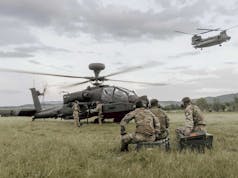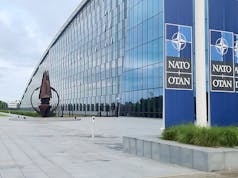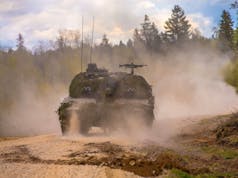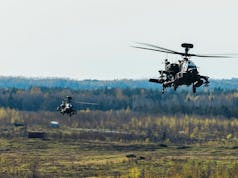BAE Systems and Milrem LCM, an Estonian provider of combat vehicle life-cycle management, have signed a contract to support Estonia’s fleet of CV9035 Infantry Fighting Vehicles (IFVs).
The agreement is part of BAE Systems’ wider contract with the Estonian government to maintain and sustain 44 CV9035 vehicles acquired from The Netherlands in 2014.
Under the long-term agreement, Milrem LCM, which is part of the Patria Group, will provide maintenance and repair services for CV9035 vehicles from its facilities in Estonia. The first batch of IFVs arrived in Estonia in October 2016, followed by a second shipment in December 2017 say the company.
“This support agreement is the cornerstone of one of Estonia’s most important capability development projects,” said Tommy Gustafsson-Rask, vice president and general manager for BAE Systems’ Hägglunds business.
“Our work with Milrem LCM will provide long-term benefits to the Estonian Defense Forces by sustaining and developing these vehicles for years to come.”
BAE Systems is also teaming with Milrem LCM to pursue an opportunity to modernize CV90 Support Vehicles under a program for the Estonian Center for Defense Investment later this year. The programme will likely cover the maintenance, repair, and rebuild of an additional 37 CV90 MkI vehicles procured from Norway.
“We are proud to work with BAE Systems as its preferred maintenance support partner in Estonia,” said Kuldar Väärsi, CEO of Milrem LCM.
“We are committed to providing the most reliable framework for the Estonian Defense Forces as the country seeks to increase the combat capability of its land forces, now and in the future.”














Hope this turns out to be good news for the brave people of Estonia. We stand by your side!
Although Estonia needs armoured vehicles to slow a Russian advance or incursion down I would think a much more effective form of military resistance against a massively more numerically superior foe would be to purchase dozens of Apache attack helicopters. Russian armoured vehicles have proven very easy to knock out using such platforms.
Helicopters in the Baltic States would be a distinctly bad idea.
1. The the extreme winds and later long winters complicates large scale rotor operations.
2. A well equipped army with a large amount of not just SAMs but shoulder launched weapons as well.
3. Distance from NATO bases and depots mean resupply likely to be unlikely. Leading to the following reason.
4. Better to plan for harassment actions by dispersed units in the forests and cities. Until NATO ie(the United States and Britain) have time to reinforce and launch a counter attack from Poland and Romania.
Make no mistake the Baltic States will fall in any scenario other than a preemptive strike. Their only meaningful contribution is to be a trip wire for war and to hold down as many occupation troops as possible. They are simply to far from the US and to close to the Russian Federations primary installations, for any other result.
What we should have gone for instead of the ASCOD
On a somewhat unrelated note does anyone know the current progress of the Warrior IFV upgrade?
Mr Bell. Your prediliction for everything Apache is well known however they can only afford 2 at a push!
Why did the British Army reject CV90?
Wasn’t it something to do with the % of build in the uk they were planning, But backtracked too late?